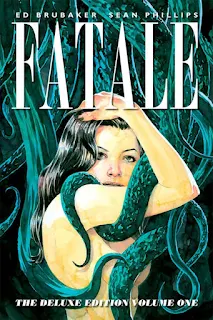[Review by Haydn Spurrell]
A femme fatale is defined as an attractive and seductive woman who will cause distress and destruction to a man who becomes involved with her. It's an age-old trope, and was once an effective use of the leading lady in crime noir and hard-boiled detective stories, now worn with use. Ed Brubaker's women have always veered close to the stereotype, with purpose, but in Fatale he takes the concept, applies it to his protagonist, and then warps it so that his story becomes unlike any you've read before. Fatale: The Deluxe Edition Vol. 1 collects the first ten issues, the trades Death Chases Me and The Devil’s Business.
[Review contains spoilers]
Josephine is a woman who is, as far as we know, immortal. We first meet her in the present, when she introduces herself to a man named Nicolas Lash at the funeral of Dominic Raines. She instantly makes an impression on him, and Brubaker establishes her hold over him throughout the book in interludes, prologues, and epilogues as a framing device. But the two central stories that make up the first Fatale deluxe edition are set in entirely different eras; one in the fifties, and the other the seventies. At first they feel like standalones, and for the most part they are. But The Devil's Business grows more and more reliant on Death Chases Me and takes advantage of the structure it establishes.
Both are similar. Jo is the protagonist, but she's also the book's greatest mystery. If you're hoping for more answers than questions, you won't find them here. Jo lures in a number of men throughout both books. In the first, it's Dominic Raines, with whom she develops a relationship (a relationship she attributes to her grandmother, when telling Nicolas Lash about it in the present-day prologue). But Brubaker plays it smart; Jo might be the main character, but she's not entirely the focal one in either story. That role is shared with the men she ensnares.
This might sound like it veers too closely to the definition, making it hard to argue that it establishes something new, but Brubaker's femme fatale is made sympathetic and in many ways heartbreaking. While I don't believe we quite see the extent of her abilities in either story, we first see what she's capable of about halfway through Death Chases Me. She manipulates a man into killing himself, and is seemingly remorseless. In The Devil's Business, we see true fear on her face when she spots some people she didn't believe still existed. In Book One she's reactive. The men steer the narrative forward, so that she's given little agency even in the climax. In Book Two, though, she becomes more proactive, in a way that feels both fitting and essential to the longevity of the series.
Walt Booker is the second-most fascinating character in Death Chases Me. He's an abusive and crooked detective who was once a soldier. Very early on, he's made out as a villain, but the further we go the more we learn. He and Jo's relationship is far deeper than first assumed, and it's a more subtle example of Brubaker's willingness to play around with expectation. The second book's protagonist, Miles, is a struggling actor who finds fame eventually, but that particular reveal mirrors Booker's own fate. It's not repetitive, but it is notable how Brubaker plays to the strength of an established formula.
Sean Phillips's environments alternate between detailed and blurry depending on the era, and his depictions of each character's facial expressions are integral to the script's impact. Brubaker and Phillips take their first steps into the horror genre here, and the visuals are frightening depictions of satanic behavior and violence. The script knows, however, when to show and when not to show. There's an understanding here that sometimes the best horror is the kind we can't see. While I wouldn't call it frightening in a way in which we've become accustomed to, it has a lasting, unnerving affect. The villainous henchmen are designed so simplistically and yet so effectively, and their leader is a pretty convincing definition of evil.
Death Chases Me perhaps comes equipped with a greater punch. Its focus on the cult and the horrors of street-level violence contrasts with the gleam of the Hollywood setting in The Devil's Business (which teases Brubaker's passion toward Hollywood history, as evidenced more completely in The Fade Out). The cast in the former is a more complete ensemble, with each character earning their sufficient amount of panel-time. The latter book's supporting characters are less involved, though there is plenty tragedy in seeing the little corner of the world that Jo creates get torn apart in The Devil's Business.
Josephine remains a mystery by the close of the first volume. The narrative leaps back and forward between character perspectives, and there's no shortage of narration from the series' prominent third-person view. It's occasionally hard to keep up as Brubaker continues to layer his supernatural noir epic with each turn of the page. His stories rely on every fine detail, and they pay off every time. The Fatale: The Deluxe Edition Vol. 1 hardcover includes covers, the trailer for Fatale, character sketches and two select essays originally printed in the monthlies.
Review: Fatale Deluxe Edition Vol. 1 hardcover (Image Comics)
February 22, 2017

Comments
Post a Comment
To post a comment, you may need to temporarily allow "cross-site tracking" in your browser of choice.